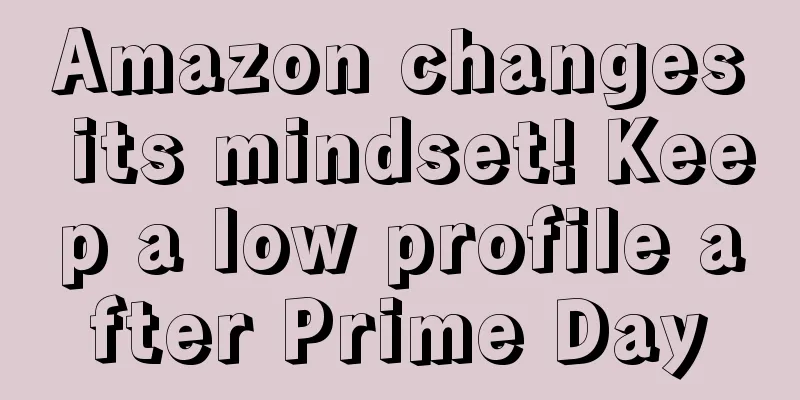Amazon changes its mindset! Keep a low profile after Prime Day

|
Prime Day has passed, and Amazon has also released the sales data of third-party sellers during Prime Day. It is said that during the entire promotion period, third-party sellers in 19 countries around the world sold more than 3.5 billion US dollars of goods, an increase of 60% over last year's Prime Day sales! This result has indeed set the best sales record in the history of the Amazon platform, but we also mentioned a very strange point in the must-read lunch report in the group today (add my WeChat account to invite you to join the group: zyqmda). Since they have set sales records, why didn’t Amazon directly disclose the sales performance of the entire platform, and publicize it like the Double Eleven sales of over 100 million in a few seconds, but instead released the data of third-party sellers for publicity? In fact, many media have mentioned this to Amazon. Since Amazon has released third-party sales data, it must also have total sales data. However, Amazon has always been secretive about its own platform sales data. This brings up an idea. The growth brought to Amazon by the epidemic this year is too dazzling, and antitrust agencies have been eyeing Amazon with red eyes. At this time, Amazon has to adopt a low-key strategy. In fact, some foreign media have analyzed this possibility. Amazon's response to this record-breaking sales performance was too bland, which inevitably led people to speculate about the motives behind it. When Amazon held its first Prime Day in 2015, it promoted it heavily, even exaggerating the data to say that " Amazon's first Prime Day broke global records and exceeded Black Friday sales ." In 2017, Amazon advertised before Prime Day ended, "Prime members are enjoying the largest global shopping event in Amazon's history." In 2019, Amazon stated in a press release that "Prime Day 2019 has exceeded the sales of Black Friday and Cyber Monday combined!" This year, Amazon broke the record again and achieved an incredible growth rate (more than 60% over last year's Prime Day), but Amazon did not promote the sales of Prime Day itself, but instead released the sales data of third-party sellers for publicity. Compared with the total sales of the platform, this number is obviously much smaller, which is not conducive to publicity, but Amazon still did it. What is the mystery behind it? Amazon's big move Let’s analyze this in light of the previous confrontation between Amazon and the antitrust investigation team. First, the antitrust team stated that "there is a lot of evidence that Amazon is establishing hegemony in the industry and engaging in unfair competition against third-party sellers and suppliers", and required that Amazon's self-operated business be separated from platform management, operated independently, subject to supervision and responsible for its own profits and losses. Amazon responded to the accusation by saying, " Amazon has always maintained a mutually beneficial cooperative relationship with third-party sellers , and the antitrust team's brutal treatment will harm the interests of thousands of small businesses." It should be clear now. The reason why Amazon did not publicize the sales of its own platform this time but singled out third-party sellers is nothing more than to establish itself as a "friend of small businesses", on the one hand to reduce the pressure of public opinion, and on the other hand to hold sellers hostage to fight against antitrust agencies. We sellers know that splitting up self-operated products will definitely do more harm than good to third-party sellers. Amazon’s support for self-operated products has been going on for a long time, and Amazon also uses the sales data of third-party sellers to develop new products for self-operated products, causing unfair competition for sellers. Without self-operated products, third-party sellers will lose a huge (potential) competitor. So in the long run, the split of Amazon is definitely good for us. However, we have previously analyzed that because the attention of antitrust agencies and public opinion is all on Amazon , Amazon is unlikely to introduce any policies or changes that harm the interests of sellers at this time. Moreover, the interests of sellers have now become a bargaining chip in the confrontation between Amazon and antitrust agencies. Amazon will certainly be more cautious and conservative in its actions involving the rights of sellers. Therefore, the recent period is also a window period of stable policies. Everyone can take this opportunity to maintain their product rankings after the big promotion and win more orders. |
<<: Primeday ended perfectly! Will Black Friday and Cyber Monday suffer?
>>: Amazon exposed for discrimination! Algorithmic push leads to controversy
Recommend
How can an old product that “really relied on luck” to reach the top 3 maintain its ranking? In half a year, its ranking dropped to 10th in a small category, and even losing money on flash sales and drastic price cuts could not save it…
Anonymous user My C position It is a non-standard ...
Peak season discrepancy! Anker ranked first in the world, but this huge sales brought it to the brink of bankruptcy!
Amazon executives recently said that judging from ...
What is PO Box? PO Box Review
PO Box, also known as Postal Box, is the abbreviat...
A large number of iPhone 15 peripheral products are in great demand, and 3C sellers are celebrating!
At 1 a.m. Beijing time on September 13, Apple'...
Labor disputes at US and Canadian ports continue! Global supply chain hit again!
According to foreign media reports, the ongoing la...
Recruitment demand surges 324%! TikTok training institutions make a fortune, and sellers are long gone?
Get the "2022 Cross-border E-commerce Annual ...
What is Amazon Headline Search Ads? Amazon Headline Search Ads Review
Amazon Headline Search Ads is a high-impact advert...
The top three apps by downloads during the 2021 US holiday shopping season: Amazon, Walmart, and Target!
More than half (55%) of U.S. online consumers down...
What is Hashtagify? Hashtagify Review
Hashtagify is a hashtag searcher that makes it eas...
What is Cotopaxi? Cotopaxi Review
Cotopaxi is a sustainable outdoor brand in the Uni...
Amazon turns to sellers for help? The platform's trend has changed dramatically
Amazon recently revealed a very funny news. In or...
Amazon Financial Data - Profits are Clearer --- Practical Sharing (Tables and Detailed Tutorials)
I believe everyone is very troubled by the statis...
The latest forecast for the US holiday season! These products will be a big hit!
<span data-docs-delta="[[20,"获悉,根据支付巨头Klar...
Save a lot of art fees! Amazon launches an AI video generator
Normal, once there is data abnormality, such as s...
What is Shenzhen Haiguang International Logistics Co., Ltd.? Shenzhen Haiguang International Logistics Co., Ltd. Review
Shenzhen Haiguang International Logistics Co., Ltd...









